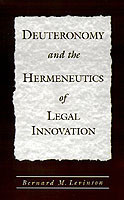Positioned at the boundary of traditional biblical studies, legal history, and literary theory, Deuteronomy and the Hermeneutics of Legal Innovation shows how the leglislation of Deuteromomy reflects the struggle of its authors to renew late seventh-century Judaean society. Seeking to defend their revolutionary vision during the neo-Assyrian crisis, the reformers turned to earlier laws, even when they disagreed with them, and revised them in such a way as to lend authority to their new understanding of God's will. Passages that other scholars have long viewed as redundant, contradictory, or displaced actually reflect the attempt by Deuteronomy's authors to sanction their new religious aims before the legacy of the past. Drawing on ancient Near Eastern law and informed by the rich insights of classical and medieval Jewish commentary, Levinson provides an extended study of three key passages in the legal corpus: the unprecedented requirement for the centralization of worship, the law transforming the old Passover into a pilgrimage festival, and the unit replacing traditional village justice with a professionalized judiciary. He demonstrates the profound impact of centralization upon the structure and arrangement of the legal corpus, while providing a theoretical analysis of religious change and cultural renewal in ancient Israel. The book's conclusion shows how the techniques of authorship developed in Deuteronomy provided a model for later Israelite and post-biblical literature. Integrating the most recent European research on the redaction of Deuteronomy with current American and Israeli scholarship, Levinson argues that biblical interpretation must attend to both the diachronic and the synchronic dimensions of the text. His study, which provides a new perspective on intertextuality, the history of authorship, and techniques of legal innovation in the ancient world, will engage Pentateuchal critics and historians of Israelite religion, while reaching out toward current issues in literary theory and Critical Legal Studies. `Bernard Levinson is a brilliant young scholar who has written an outstanding book about how the Covenant Code from Mount Sinai became the Code of Deuteronomy at the borders of the River Jordan. It is a fascinating discourse on how to change law without changing tradition. The importance of Biblical law for canon theory, Biblical narrative, and Israelite religion usually is underestimated; this new approach will hopefully get more people reading law, and especially Deuteronomy. It will be compelling to both American and European readers as it integrates the leading scholarly discourses of both communities.' Norbert Lohfink, SJ, Professor of Biblical Studies, Philosophisch-Theologische Hochschule Sankt Georgen, Frankfurt `An exemplary work of biblical scholarship--careful and controlled by analytic rigour, yet bold and innovative in its scope and suggestions. Students of ancient law, legal literature, religion, and culture will greatly benefit from Levinson's work.' Michael Fishbane, Nathan Cummings Professor of Jewish Studies, University of Chicago `In noting that the Deuteronomic innovations were not simply interpolated into a reworked version of the Covenant Code but rather presented in a new, complete composition, Levinson demonstrates his own primary commitment to the text, to the history of textual transmission, and to the social milieu in which the text functions. Levinson elegantly presents the use of the Covenant Code as both a source and resource for the Deuteronomic authors.' Martha T. Roth, Professor, Oriental Institute, University of Chicago and Editor-in-Charge of the Chicago Assyrian Dictionary `Bernard Levinson's book is a major study. He demonstrates the radical break with the past and the way in which the authors or composers of Deuteronomy not only transformed religion and society in ancient Israel but also radically revised its literary history. The power and accomplishment of the Deuteronomic movement has rarely been so clearly demonstrated. Levinson's work is a clarification of the way in which hermeneutics is not something that starts with the interpreter's handling of the canonical text but is a process by which the canonical text itself came into being. He shows how the new text subverts and dominates older texts in behalf of a radical cultural and religious transformation. With this book, Levinson places himself in the front rank of Deuteronomy scholars.' Patrick D. Miller, Charles P. Haley Professor of Old Testament Exegesis and Theology, Princeton Theological Seminary
EAN 9780195112801
ISBN 0195112806
Typ produktu Pevná vazba
Vydavatel Oxford University Press Inc
Datum vydání 8. ledna 1998
Stránky 224
Jazyk English
Rozměry 236 x 160 x 25
Země United States
Autoři Levinson Bernard M.



















